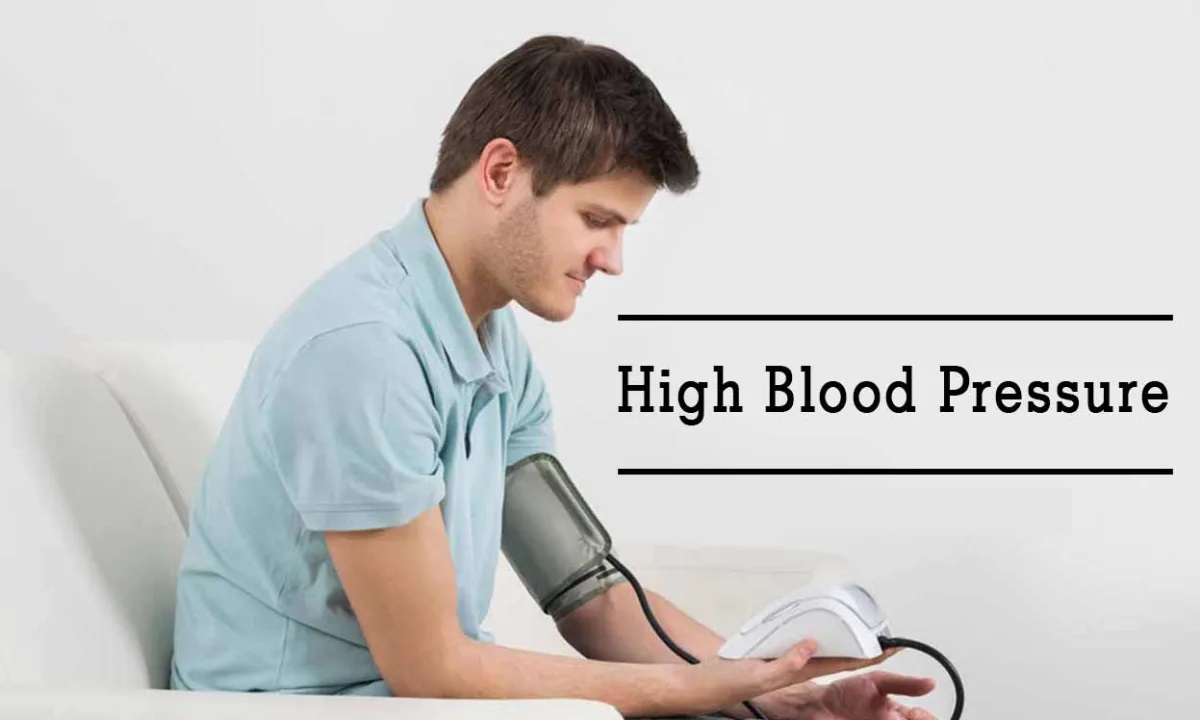

Home > Symptoms > High Blood Pressure (Hypertension) Symptoms - Causes, Diagnosis & Treatment | Max Lab

High blood pressure can be dangerous if it is not treated. It puts you at risk for a stroke, heart failure, kidney failure and other medical problems. Fortunately, you can reduce your risk by changing what you eat, exercising more and taking your medication.
Blood pressure is the measurement of the pressure or force of blood as it pushes against your blood vessel walls. When you have high blood pressure (hypertension), this means the pressure against these walls in your body is consistently too high. High blood pressure is often called the "silent killer" because you may not know anything is wrong, but the damage is still occurring within your body.
Your blood pressure reading will have two numbers. The first number is the systolic blood pressure, which measures how much force your blood vessels are being put under when your heart beats or contracts. The second number is diastolic blood pressure, which measures how much force your blood vessels are under when they relax between beats.
Your doctor will determine which of two types of high blood pressure you have:
Serious health issues caused by untreated hypertension include:
10% of all pregnancies are complicated by high blood pressure. Pregnancy-related hypertension can take many various forms and ranges in severity from moderate to severe.
The kinds of elevated blood pressure during pregnancy include:
During prenatal visits, your provider will regularly monitor your blood pressure; nevertheless, if you have any worries about your blood pressure, be sure to discuss them with your provider.
Two numbers are used to obtain a blood pressure reading. The pressure in your arteries while your heart beats and pumps blood through them is depicted by the top figure, the systolic pressure. Diastolic pressure refers to the measurement of the pressure in your arteries between heartbeats (bottom number).
Adult blood pressure readings fall into one of five categories:
A pressure cuff is used to take a blood pressure reading. You must have a properly fitting cuff in order to get an accurate reading. Unreliable readings could result from a poorly fitting cuff.
Children and teenagers have varying blood pressure readings. If you are instructed to check your child's blood pressure, ask the doctor what levels are considered healthy for them.
High blood pressure can impact your health in a variety of different ways. Your kidneys, eyes, heart, brain, and other vital organs could sustain serious harm.
The good news is that you can usually manage your blood pressure to lower your risk of becoming really ill.
By making your arteries less elastic, high blood pressure can harm them, which reduces the flow of blood and oxygen to your heart and increases the risk of heart disease. Additional effects of insufficient myocardial blood flow include:
High blood pressure can rupture or become blocked in the arteries that carry blood and oxygen to the brain, which can result in a stroke. During a stroke, brain cells perish because they do not receive enough oxygen. Serious impairments in speech, movement, and other everyday activities can result after stroke. Additionally fatal is a stroke.
High blood pressure is associated with dementia and decreased cognitive function later in life, particularly in midlife.
Adults with diabetes, high blood pressure, or both are more likely than healthy adults to develop chronic kidney disease.
Primary hypertension is another name for essential hypertension. Over time, this sort of hypertension develops. This type of high blood pressure is typical.
Several of the following causes can combine to cause essential hypertension:
Secondary hypertension typically appears quickly and may worsen, in contrast to primary hypertension. Secondary hypertension can result from a number of causes, including:
Taking a blood pressure reading is all that is necessary to diagnose hypertension. As part of a routine visit, blood pressure is typically checked in medical offices. Request a blood pressure reading if you don't already have one at your upcoming appointment.
Your doctor might want you to get further measurements over the course of a few days or weeks if your blood pressure is elevated. Rarely is hypertension diagnosed after just one reading.
Your doctor needs to see proof of a persistent issue. That's because your surroundings, such as the tension you could experience when visiting the doctor, can contribute to elevated blood pressure. Throughout the day, blood pressure readings fluctuate as well.
Your doctor can find any further problems causing your high blood pressure with the aid of these tests. They can also examine any potential organ damage caused by high blood pressure.
Your doctor might start managing your hypertension at this time. Your chance of permanent injury may be lowered with early treatment.
Your doctor uses a variety of variables to choose the best course of treatment for you. These variables include the type of hypertension you have and the known causes.
If you have primary hypertension, changing your way of life may help lower your blood pressure. Your doctor might suggest medication if changing your lifestyle alone is insufficient or if it becomes ineffective.
Treatment will centre on that other problem if your doctor determines that there is another condition causing your hypertension. Your doctor may try different drugs if the one you're currently taking is raising your blood pressure, for instance, if they don't have the same adverse effect.
Occasionally, despite receiving treatment for the underlying cause, hypertension persists. In this situation, your doctor could advise medication to help lower your blood pressure along with lifestyle modifications you can make.
Plans for treating hypertension frequently change. What initially worked may lose its value with time. Your doctor and you will keep collaborating to improve your care.
Many people experiment with different blood pressure drugs before finding one that works. In order to identify one or a combination of medications that is effective for you, your doctor might need to test a few different ones.
Among the drugs used to treat high blood pressure are:
The course of treatment will depend on a number of variables, including the blood pressure level and the likelihood of developing cardiovascular disease or a stroke.
As blood pressure rises, the doctor will advise several therapies. They might advise altering one's lifestyle and keeping an eye on blood pressure if one has mildly elevated blood pressure.
They will advise taking medication if your blood pressure is high. Depending on how severe the hypertension is and whether problems like kidney disease develop over time, the options may alter. Some patients might also require a mix of numerous different medicines.
You can manage the causes of hypertension by making healthy lifestyle changes. Some of the most common are listed below.
A diet rich in heart-healthy foods is essential for lowering high blood pressure. Additionally, it's crucial for controlling already-controlled hypertension and lowering the likelihood of problems. Heart problems, strokes, and heart attacks are some of these issues.
A heart-healthy diet emphasizes:
Exercise can strengthen your cardiovascular system and help you lose weight (if your doctor has advised it). It can also naturally lower your blood pressure.
Try to get 150 minutes a week of moderate exercise. Five times a week for roughly 30 minutes.
If you have obesity, a heart-healthy diet and more exercise can help you maintain a reasonable weight and lower your blood pressure.
Exercise is a great way to manage stress. Other activities can also be helpful. These include:
A good night's sleep may also assist lower stress levels.
Your physician would likely urge you to stop smoking if you have high blood pressure and smoke. The body's tissues can be harmed by the toxins in cigarette smoke, which can also stiffen blood vessel walls.
Ask for assistance to cut back on your drinking or quit completely if you frequently consume too much alcohol or if you have an alcohol addiction. Overindulging in alcohol can cause blood pressure to rise.
Complications are more likely to occur in pregnant people with high blood pressure. For instance, impaired kidney function may occur in pregnant women with hypertension. Babies born to hypertensive mothers or fathers may be underweight at birth or arrive early.
During pregnancy, some people may develop hypertension. There are various high blood pressure issues that might arise. Once the baby is born, the condition frequently goes back to normal. Your chance of getting hypertension later in life may increase if you experience hypertension during pregnant.
Preeclampsia during pregnancy can occasionally develop in hypertensive pregnant women. Increased blood pressure can have negative effects on the kidneys and other organs. This may result in high urine protein levels, problems with liver function, fluid in the lungs, or vision impairments.
The hazards to the mother and infant increase as this illness gets worse. Eclampsia, which causes seizures, can result from preeclampsia. Pregnancy-related high blood pressure issues continue to be a major factor in maternal deaths in India. Low birth weight, early delivery, and stillbirth are all complications for the newborn.
Preeclampsia can only be treated by giving birth because there is no known way to prevent it. Your doctor will constantly watch you for complications if you get this condition while pregnant.
Hypertension, also known as high blood pressure, is a condition in which the force of the blood against the walls of the arteries is too high.
Some of the most common reasons for high blood pressure include:
Foods which increase blood pressure are salt, caffeine, and fatty foods.
There are a number of things you can do to lower your blood pressure, including:
Yes, Stress causes the body to release hormones that constrict blood vessels and raise blood pressure.
If you have high blood pressure, it’s important to monitor it at home using a home blood pressure monitor. This will help you keep track of your numbers and see how well your treatment plan is working.
There are several different types of medications that can be used to treat high blood pressure. Some of the most common include diuretics, ACE inhibitors, beta blockers, and calcium channel blockers.
 Allergy Test
Allergy Test
 Anemia Test
Anemia Test
 Auto immune
Auto immune
 Blood disorder
Blood disorder
 Bone and Joint
Bone and Joint
 Cancer Test
Cancer Test
 Cardiology Test
Cardiology Test
 Covid Recovery
Covid Recovery
 Dengue Test
Dengue Test
 Depression
Depression
 Diabetes Test
Diabetes Test
 Fatigue
Fatigue
 Fever Test
Fever Test
 Full body
Full body
 Gastro Test
Gastro Test
 Gastrointestinal
Gastrointestinal
 Gynaecology Test
Gynaecology Test
 Heart Test
Heart Test
 HIV Test
HIV Test
 Hormone Test
Hormone Test
 Hypertension
Hypertension
 Immunity Test
Immunity Test
 Infectious Disease
Infectious Disease
 Infertility Test
Infertility Test
 Influenza Test
Influenza Test
 Iron Test
Iron Test
 Kidney Test
Kidney Test
 Liver Test
Liver Test
 Lung Test
Lung Test
 Nephrology
Nephrology
 Obesity
Obesity
 Orthopedics Test
Orthopedics Test
 Physician
Physician
 Pollution Health Checkup
Pollution Health Checkup
 Pregnancy Test
Pregnancy Test
 Prostate Test
Prostate Test
 Senior Citizen Test
Senior Citizen Test
 STD Test
STD Test
 Thyroid Test
Thyroid Test
 Tuberculosis Test
Tuberculosis Test
 Vitamin Test
Vitamin Test
 Women Health Test
Women Health Test